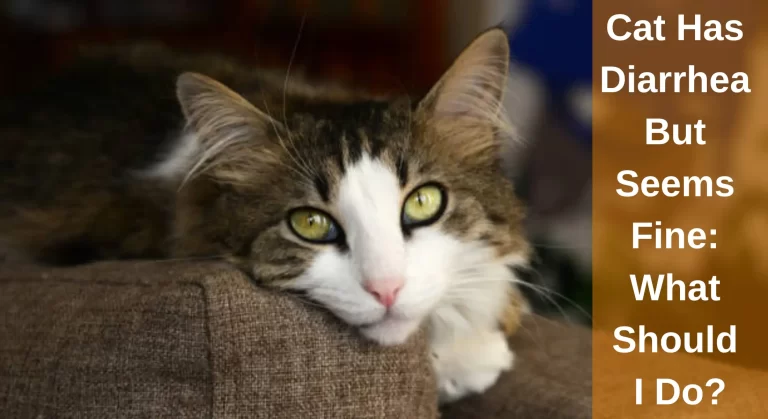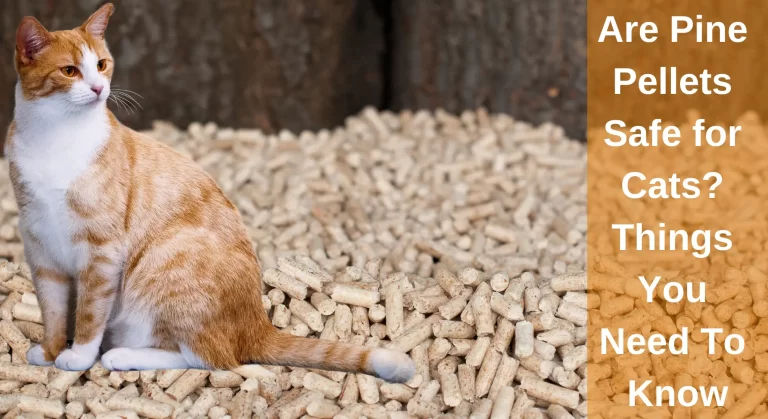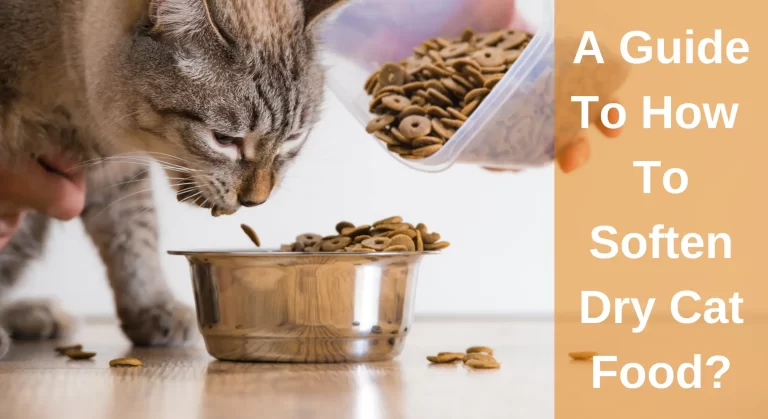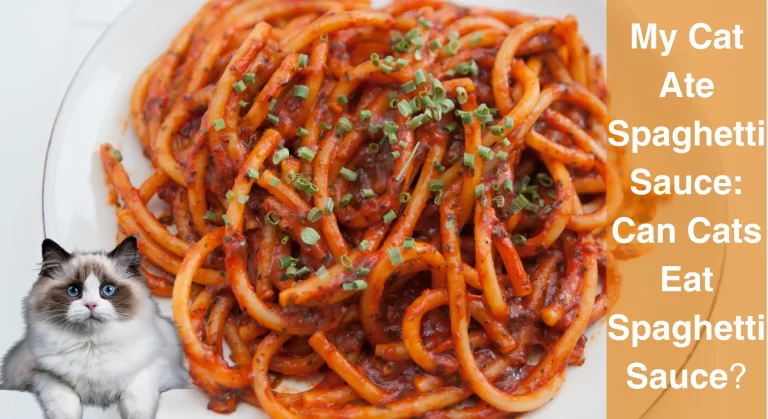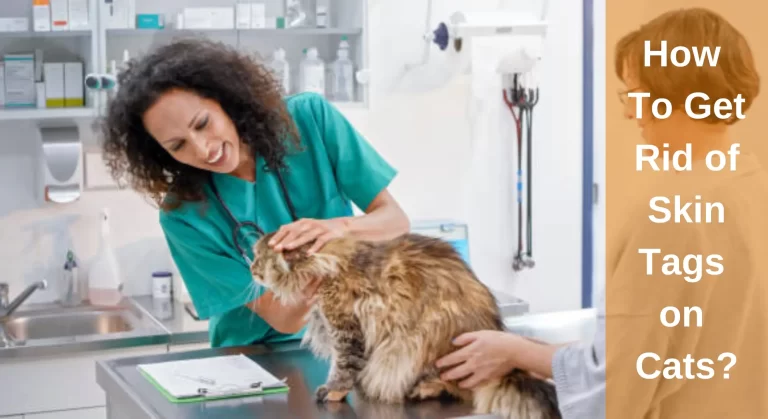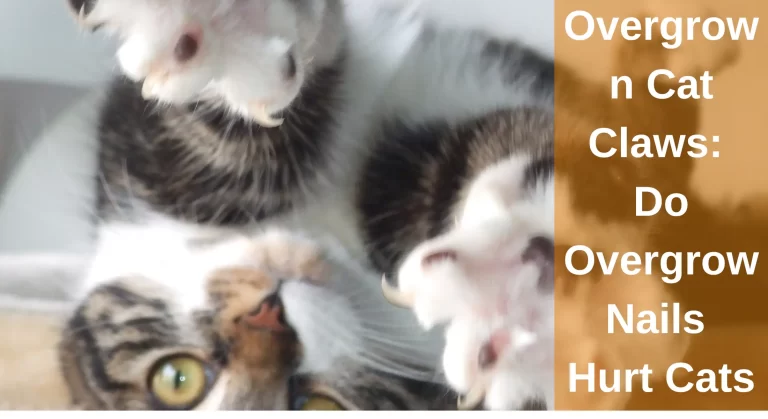Do Cats Eat Mice Whole? Things You Need To Know
Inborn hunters, cats. Even if they are already domesticated, they will always have a need to hunt. Although their favourite prey is mice and birds, they will also frequently pursue other animals like snakes and rabbits. “Do Cats Eat Mice Whole?”
Cats can consume mice whole, but most prefer eating them in pieces. This includes leaving out the stomach and spleen parts that they dislike eating and do not relish eating.
If you’ve ever wondered whether cats swallow their prey entirely, like mice do, keep reading for some shocking findings.
Do Cats Eat Whole Mice?
Actually, it all comes down to the cat. Some cats will eat them whole, depending on the size of the mouse. Other cats may place the mouse in their teeth and devour it whole, biting off the tail in one motion.
Some individuals may eat the mouse whole but will toss out the guts or spleen. However, other cat owners claim that their feline buddy just eats the body and tail or only the head. Other cats will decapitate the mouse, but only one or two of its legs will be eaten. Whole mice may not be eaten by certain cats unless another cat is threatening to take them away. Others may chew on mouse intestines for a while but avoid the gizzard due to its acidic flavour. Interesting to note is that indoor cats are less likely to eat mice than outdoor, feral, or stray cats.
Although cats will hunt and kill mice, they may not always eat them whole since they might be trying to teach you how to search for food, much like their mother cats did for them. When they are merely pursuing a mouse, the pleasure could get too rough. Some felines will go out and kill something to offer as an offering to their people. Although some cats may seek and kill mice, they rarely eat them unless they are really hungry. While being captured by other cats, the mice will be left lying around the home since the other cats won’t know what to do with them.
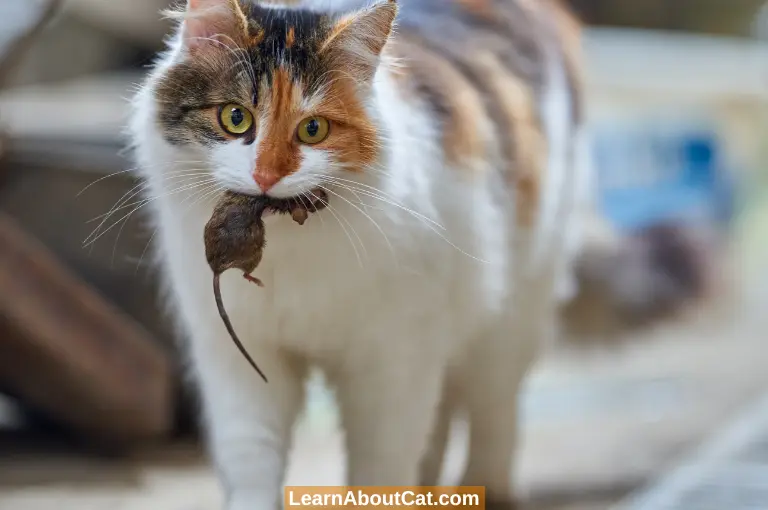
Do Cats Like Whole Mice to Eat?
Cats are typically trained to catch mice. Mice make great prey since they are plentiful, easy for cats to capture, and loaded with protein and taurine. Typically, cats kill and eat their prey whole (apart from the gizzard and intestines), but on rare occasions, they’ll leave dead mice as gifts for their owners. Cats seldom eat mice, but when they do, they frequently prefer to eat the whole thing. Of course, environmental factors also have a big impact on this behaviour.
Your cat could be less interested in eating rodents and, at most, view them as a pastime if it has only ever been domesticated and its mother never taught it how to capture mice. As a consequence, you could find whole, dead mice scattered around and a cat contentedly devouring its usual cat food.
Do Cats Dislike Whole mice?
It is less likely that cats dislike whole mice since they either never learned how to hunt them or don’t feel the need to eat them. Furthermore, some cats are simply too lazy to bother. For example, many indoor cats may pursue mice, but if they catch one, they simply leave it lying around since they are unsure of what to do with it.
Why Do Cats Eat Whole Mice?
Mice hunting is a common instinct in cats. Regardless of whether they are inside or outside, cats will swiftly search for mice and other small animals, just like they would in the wild. They only engage in it since it is a natural part of who they are and comes naturally to them. You might be wondering if cats swallow mice whole after catching them. Different cats have different dietary habits. Similar to us, some animals eat quickly while others fully chew their food. Both are typical, and the slight difference in personalities only influences how a cat eats mice.
Key components include:
The level of hunger, predator threat and environment as well.
A cat who spends most of the day hunting mice indoors is more likely to interact with the food. This occurs regularly because indoor cats are typically well-fed. As a result, they are less tempted to swallow a mouse whole. A cat who is hungry will behave differently from one that is merely enjoying itself while hunting.
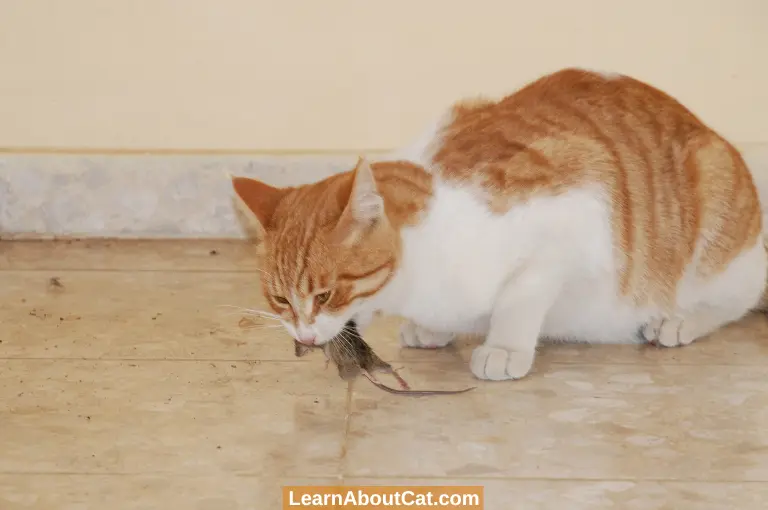
1. Hunger is One Element that Influences How a Cat Consumes Mice
It will often depend on how hungry the cat is. A cat will consume a whole mouse in one or two bites when it is hungry. The cat will just try to complete its meal as soon as possible since it is simpler. It is akin to someone who is starving and has food in front of them. You must take the cat’s degree of hunger into account when determining whether or not cats consume mice whole.
Check Out: Why Do Cats Eat Mice Heads?
2. Level of Predator Threat
How a cat eats mice depends on the threat level offered by predators. When the cat begins to hunt and consume mice, the surroundings will be crucial. Taking a cat as an example, eating outside exposes them at a time when they are vulnerable (i.e. fixated on the meal). Instead, they search for a secret dining location.
3. Environment
The environment should also be considered. Where is the cat devouring the mouse, for instance? The cat won’t feel intimidated if it is consuming the mouse inside. Understanding how a cat perceives its environment and consumes the mouse depends on knowing this. Outside cats frequently consume their food quickly in order to finish it and save energy. While an outside cat would prefer to swiftly devour the mouse. The weather and other such factors are among the many additional variables that occur outside. This could change the way a cat consumes a mouse.
Do All Felines Hunt Mice?
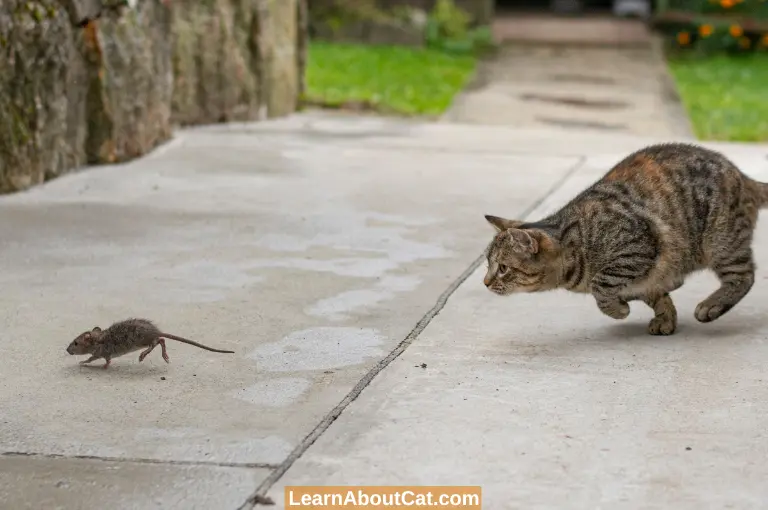
Not all cats hunt and consume entire mice, though. Many indoor cats would happily catch the mouse, but because they never had any instruction, they would have no idea what to do with it. Then, they will give it to you (alive or dead) so you can deal with it and provide evidence that they actually obtained it.
Is your cat starving enough to eat an entire mouse? If a cat is not hungry, even those that live outside might not eat a mouse, and they are probably not going to eat one if they are constantly feeding at home.
Age and General Health
Older cats may not hunt and consume mice as swiftly as younger cats, depending on their general health. Despite the fact that capturing mice can be easier than, say, catching birds, it still calls for considerable speed and agility.
If your cat only spends time inside, it is quite unlikely that it will be interested in consuming whole mice (or any part of the mouse for that matter).
Can Whole Mice Kill My Cat?
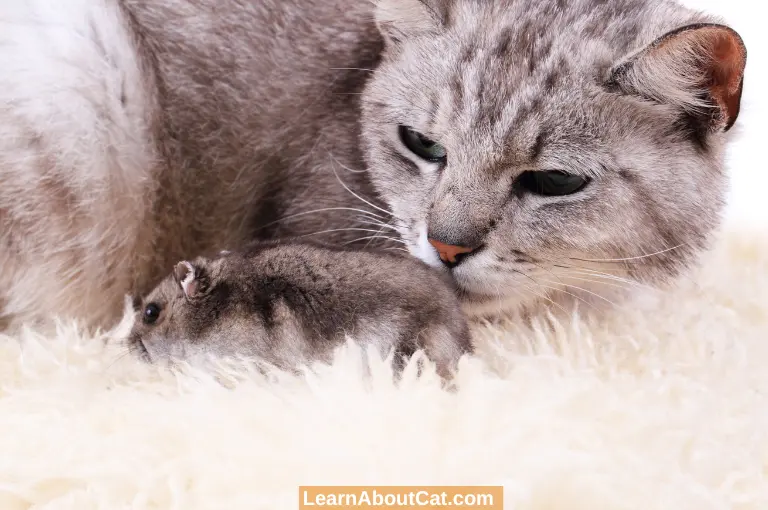
Despite the fact that cats are hardwired to eat entire mice, this does not always imply that mice are beneficial to cats. Look out for the following to protect your mouse:
Choking. When a cat is fast consuming a mouse, a bone that gets lodged in its jaws or neck can cause serious damage including choking. If you observe that your cat is acting abnormally, drooling excessively, bleeding from the mouth, having difficulty breathing, or exhibiting any other of these signs, call your veterinarian right once.
Following poisoning Cats who eat poisoned mice run the danger of experiencing further poisoning. It’s still important to monitor even if it’s rare and the risk diminishes the longer the mouse was poisoned. If your pet exhibits symptoms like vomiting, drowsiness, diarrhoea, muscle spasms, or other strange behaviours, call your veterinarian right away.
Even while most cats wouldn’t perish from consuming whole mice, you should see a veterinarian if you observe anything unusual about your cat’s behaviour or health. If your cat has been pursuing wild mice, in particular, you have no clue what else it could have unintentionally consumed.
What Happens If A Cat Eats A Whole Mouse?
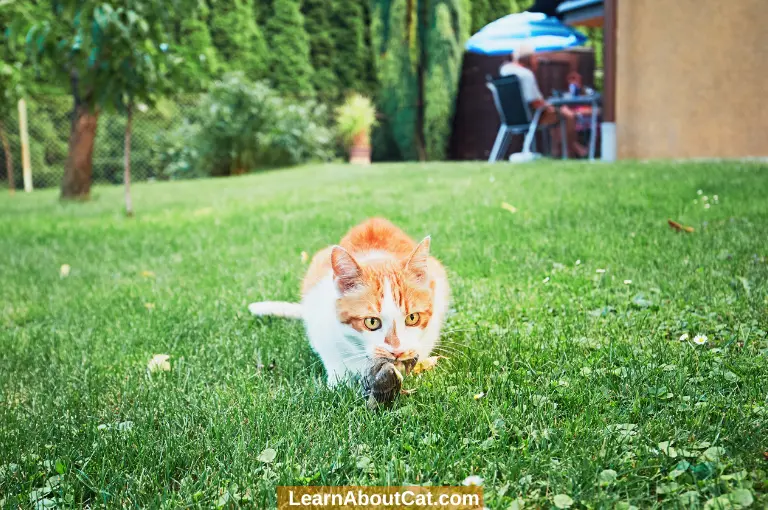
Cats who eat mice are often infected with several parasites. These parasites can lead to health problems for cats as a result. Some of these parasites have even been known to jump onto people and infect them.
The parasite that is most common is the roundworm. Roundworm larvae are frequently found in muscular tissue, so they are easily spread to the gut when your cat bites on a mouse.
Roundworms may be very difficult to eradicate, and they frequently impair young cats’ growth as well as the health of senior cats that are already weak.
Roundworms are generally not hazardous for healthy adult cats thanks to deworming, which is a good thing because you still want to get rid of them! It is advisable to avoid roundworms since they can spread to humans and harm people, particularly small children. Any outdoor or outdoor/indoor cats should undergo routine parasite testing and at least two years of deworming treatments. In addition to preventing more specific worms and parasites, routine checkups also help an outdoor cat live longer in general.
Can a Cat Consume a Whole Mouse?
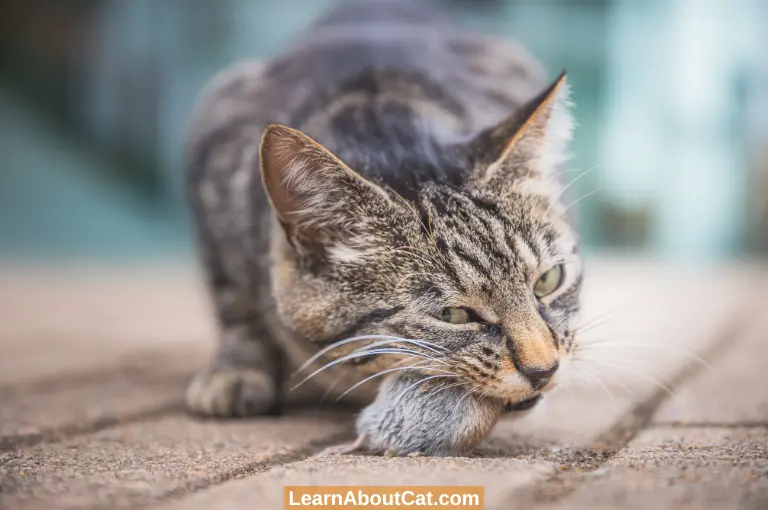
Yes, Cats can certainly eat an entire mouse, depending on the size of the rodent. Many indoor cats would happily seize the mouse, but they are untrained and would not know what to do with it. Then, while bragging about having caught it, they’ll bring it to you (alive or dead) for handling. If a cat is not hungry, even outdoor cats may decline to eat a mouse, and they are less likely to do so if they usually eat at home.
Depending on their general health, older cats may not hunt and consume mice as quickly as younger cats. Despite the fact that collecting mice is simpler than catching birds, it still requires quickness and agility.
Is It Normal For A Cat To Eat A Whole Mouse?
Mice are frequently eaten whole by cats in the wild. This helps the cat to digest its meal rapidly and safely while avoiding predators. An entire mouse can occasionally be consumed by cats. It is not recommended or encouraged to regularly consume mice since they can give your cat roundworms. Additionally, they are toxoplasma gondii carriers, which is the pathogen that causes toxoplasmosis.
Cats’ propensity for collecting mice is frequently ingrained. Because they are easy to catch, rich in protein and taurine, and numerous, mice are the ideal prey for cats.
How Many Mice Do Cats Eat In A Day?
A wild cat would normally eat nine mice every day, with a few unsuccessful hunts thrown in for good measure. If left to their own way, cats would consume multiple little meals throughout the day as opposed to the one to three meals that their domesticated counterparts ingest.
Cats receive the protein, energy, and taurine they require to maintain their way of life from this quantity of mice. It is unlikely that your cat would eat mice if it only goes indoors. Instead, it could offer you a dead mouse or bring you one to kill, but it won’t eat it.
Frequently Asked Questions
The Bottom Line on Do Cats Eat Mice Whole
Cats will go after mice because they are natural hunters. Each cat is unique, and this can be observed in the way that they eat its prey. Some cats merely eat the heads of the mice, while others decapitate the rodents and leave them for dead.
Who is Isabella?
My name is Isabella, and I am a dedicated and knowledgeable cat enthusiast. With years of experience caring for cats and a deep love for felines, I made a mission to help other cat lovers navigate the challenges of cat ownership.

